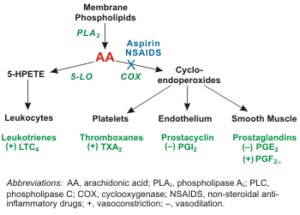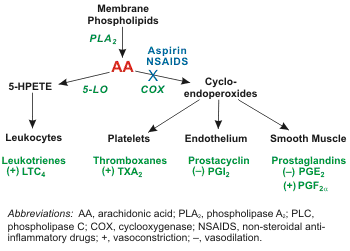Dr. Weeks’ Comment: After my friend Professor Brian Peskin did this interview, he sent me the link to listen. He was sensational – so much to share. List to this great radio broadcast from 10-5-17 and stop your fish oil now. What to eat to nourish your cell membrane and protect your heart and nervous system and prevent dementia? Pure omega 6 seed oil made from unadulterated non-hydrogenated whole crushed seeds. Try: SOUL CORE and FORM !
Here is a metabolism chart of arachidonic acid from omega 6 fatty acids:

Prostaglandins (PGF2a, PGD2, PGE2, PGE1); PGI2 (prostacyclin),
TXA2 (thromboxane A2)
PGE2 – inflammatory
PGI2 as its primary derivative of arachidonic acid. This prostanoid is a potent vasodilator and inhibitor of platelet adhesion to the endothelium, and acts through the Gs-protein pathway. Therefore, it is anti-thrombotic. These actions are similar to those of endothelium-derived nitric oxide.
PGI2 as a Regulator of Inflammatory Diseases
Received 8 March 2012; Accepted 24 May 2012 – Academic Editor: Nicolas Flamand
CLICK HERE for the FULL ARTICLE
“… PGI2 regulates both the innate and adaptive immune systems and its effects are, for the most part, thought to be anti-inflammatory or immunosuppressive in nature, which may have implications for its further clinical use…”
 Abstract
Abstract
Prostacyclin, or PGI2, is an end product derived from the sequential metabolism of arachidonic acid via cyclooxygenase and PGI synthase (PGIS). The receptor for PGI2, IP, can be found on a variety of cell types and signaling through this receptor exhibits broad physiological effects. Historically, PGI2 has been understood to play a role in cardiovascular health, specifically having powerful vasodilatory effects via relaxation of smooth muscle and inhibiting of platelet aggregation. For these reasons, PGI2 has a long history of use for the treatment of pulmonary arterial hypertension (PAH). Only recently, its importance as an immunomodulatory agent has been investigated. PGI2 regulates both the innate and adaptive immune systems and its effects are, for the most part, thought to be anti-inflammatory or immunosuppressive in nature, which may have implications for its further clinical use.
… PGI2 regulates both innate and adaptive immunity and its effects are, for the most part, anti-inflammatory or immunosuppressive in nature. PGI2 modulates the function of dendritic cells, macrophages, monocytes, endothelial cells and eosinophils

